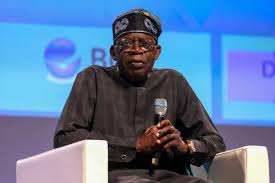National Showdown: 36 Governors Reject Tinubu's Tax Reforms Here's Why The Presidency Is Pushing back
National Showdown: 36 Governors Reject Tinubu's Tax Reforms—Here’s Why the Presidency is Pushing Back!
By Achimi Muktari
In a dramatic turn of events, all 36 state governors have unanimously rejected President Bola Tinubu’s National Tax Reforms Bill, urging its immediate withdrawal from the National Assembly. This bold move marks a major blow to the efforts of the Taiwo Oyedele-led Presidential Fiscal Policy and Tax Reforms Committee, which has been working to streamline Nigeria’s complex tax system.
The governors, speaking during Thursday’s National Economic Council (NEC) meeting, chaired by Vice President Kashim Shettima, expressed their concerns about the bill, emphasizing the need for more comprehensive consultations before any reform is implemented. Oyo State Governor, Seyi Makinde, announced the council’s resolution, stating that the bill should be withdrawn to allow for wider dialogue and consensus building.
A Call for National Consensus
Governor Makinde stressed that the governors believe wider consultations are necessary to ensure the reforms benefit the entire country and not just specific regions. “We recommended the need to withdraw the bill currently before the National Assembly on tax reforms to allow for broader consultations and to build consensus,” Makinde stated after the NEC’s 144th meeting at the State House, Abuja.
Makinde also acknowledged a presentation by Taiwo Oyedele, Chairman of the Presidential Committee on Fiscal Policy and Tax Reforms, but said the governors were not convinced by the proposals aimed at restructuring Nigeria’s taxation system for economic growth.
What’s at Stake?
The proposed National Tax Reforms Bill, developed by the Oyedele-led committee and submitted to the National Assembly, aims to simplify tax processes, streamline revenue services, and foster a more business-friendly environment. Some of the key elements of the bill include:
Eliminating multiple taxation by consolidating various taxes.
Renaming the Federal Inland Revenue Service (FIRS) to Nigeria Revenue Service to emphasize its role in handling tax administration across all levels of government.
Proposing a Joint Revenue Board to enhance cooperation between federal, state, and local tax authorities.
Establishing an Office of the Tax Ombudsman to address taxpayer grievances.
The reforms are also intended to align tax administration across the country’s three tiers of government, reducing inefficiencies and improving coordination among tax authorities.
Northern Governors’ Opposition
This rejection from the state governors follows strong opposition earlier this week from the Northern Governors’ Forum, which voiced concerns about the proposed Value Added Tax (VAT) distribution model. The governors argued that the reforms would disadvantage northern states, potentially leading to job losses and increased economic strain. Gombe State Governor, Muhammed Yahaya, emphasized that the bill would harm the region, which relies heavily on agriculture, a VAT-exempt sector.
Presidency Pushes Back
In response, the Presidency has mounted a vigorous defense of the bill, insisting that the reforms are not targeted against any region and would benefit all states. Presidential spokesperson Bayo Onanuga issued a statement titled ‘Explainer: Proposed Tax Reform Bills Not Against the North; They Will Benefit All States’, where he emphasized that the reforms would simplify tax obligations and improve the efficiency of Nigeria’s tax system without increasing the number of taxes.
“These laws are designed to optimize and simplify existing tax frameworks without imposing new taxes on Nigerians,” Onanuga stated, adding that the reforms aim to create new opportunities for job creation and economic growth.
On the contentious VAT reform, Onanuga clarified that the proposal seeks to ensure that tax distribution is fairer by considering where goods and services are consumed, not just where VAT is remitted.
The Road Ahead
With the governors pushing back and critical stakeholders voicing concerns, the bill’s future hangs in the balance. The National Assembly, which has the final say, unexpectedly adjourned plenary to November 19 after receiving the bill, delaying further debate on the reforms. Both the Senate and the House of Representatives are now set to scrutinize the proposals amid heightened tensions and opposition from the state governors.
As Nigeria awaits the next chapter in this tax reform saga, the question remains: will President Tinubu’s government be able to find common ground with the governors, or will this bill face further delays and revisions?
The weeks ahead promise intense political negotiations and debates that could reshape the future of Nigeria’s tax landscape.





















